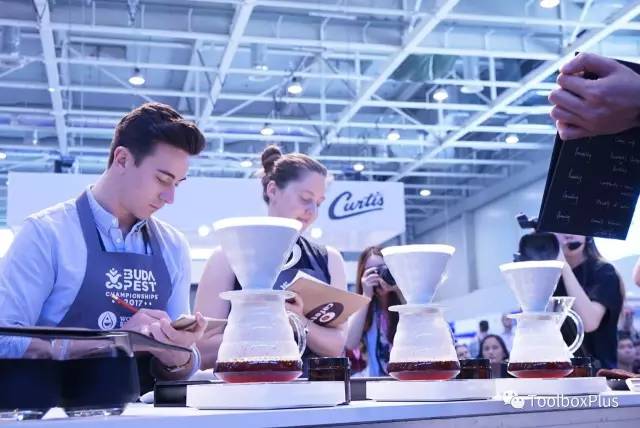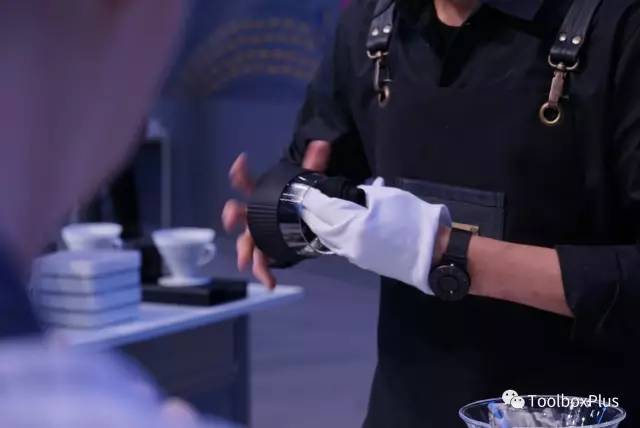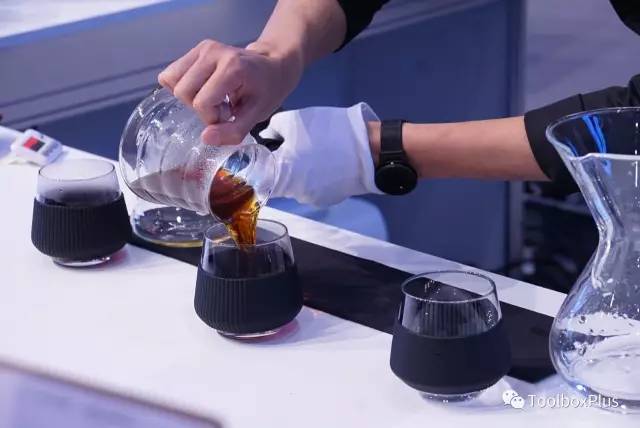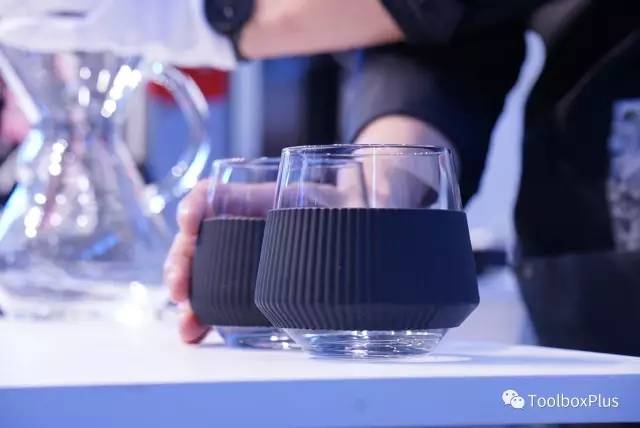作者:未知 来源:手冲咖啡: 咖啡知识 > 咖啡竞赛 > 2026-02-28 07:13:16
2017世界咖啡冲煮大赛已经过去一个月了,很多朋友在后台问冠军王策的台词(以及中文翻译),所以长话短说,这就来了。
本文由于技术原因无法附上比赛视频,如果需要参考请到腾讯视频搜索:王策比赛。
本文图片均摄于布达佩斯世界比赛现场,请勿在未经允许下使用,转载请联系后台,谢谢啦。
中文翻译版
评审们,欢迎你们,我是Chad。去年这一整年,通过不断品尝不同的咖啡,我对咖啡的认知改变了许多。我意识到,我们的咖啡其实是由一片片“记忆”组成的。那么今天,我想将咖啡、咖啡师、以及顾客的关系联结起来。首先,请让我用热水为客人们温杯。现在,我想邀请你们打开自己的记忆和新的眼界。让我们从#227批次说起,这是上个月我从巴拿马杯测桌上300多支咖啡豆中,特别为你们挑选出的。
90+ 瑰夏庄园位于巴拿马的Volcan (火山区),一个叫做Silla de Pando的地方。一共183公顷的面积,有超过三分之一的面积是野生的高大的遮荫树。1800米的高海拔让这里的日间温度很高,而到了晚上会因为太平洋的潮湿海风让温度骤降。日夜的温差可以从8摄氏度到30摄氏度, 湿度达到80%。微气候条件造就了上好的咖啡果实。这片美丽的土地让生命更繁茂、更有活力,不只是咖啡,还有200多位咖啡工人和他们的家人。
这是您的台卡,女士优先。评审们,我会陆续把信息告诉您,希望各位放松享受我的展演,不许费神笔记。您面前的台卡可以带回后台,作为参考依据。

今年的三月中旬,227批次的紫色成熟咖啡果实被一个个手工摘下来。之后放入玻璃盒子里,储藏在恒定低温的暗室中进行发酵。然后,再单层平铺,在“蓝房间”(以90+创始人Joseph Brodsky的宝宝命名的加工室)中进行21天缓慢的干燥。这是一个新的处理方式,可是这些又和今天有什么关系呢。请想象,为了一杯“干净”的咖啡,工人们要采摘颜色一致的鲜果,之后的发酵过程使糖分解成乳酸和香气酯分子,在您的口中则会是一种“菠萝般的酸质”。产地的咖啡处理信息固然重要,但是只有当作为咖啡师的我将这些信息与您和这杯咖啡联结在一起,这些信息才有价值。
我们的连结要从烘焙说起,我的烘焙师于清就是在这里 - 布达佩斯烘的我的比赛豆。烘焙日期是三天前,用时9分20秒,Agtron色值是70-87. 这个烘焙曲线让这支咖啡有了蜂蜜般的甜感,和丰富的层次感。
作为一名咖啡冲煮者,我会为每一支咖啡寻找最适合它的冲煮方法。今天,我选择了陶瓷的V60滤杯,因为它的保温效果佳,并且让咖啡从热到冷有更丰富的酸质变化,让这杯咖啡更精致。我用了滤纸让口感干净,并且在后台事先湿纸,让我的V60的温度降到室温,而冷的陶瓷材质可以增强香气强度。这,是我们今天第二个联结。

我把研磨好的咖啡粉放到这个黑色玻璃罐中,减少空气接触和阳光所带来的氧化。今天,我会用15克的咖啡,250毫升的水,最后得到220毫升的咖啡液体。并且,我用了比较细的研磨度,您可以从面前的台卡中看到确切的研磨度。这个方法增加了醇厚度。我还带来了我自己的冲煮用水,它的杂质被过滤掉了,添加了镁增加甜感。水的TDS值是70, PH值是6.8, 它为我的咖啡带来了柔软的触感和干净的余韵。
烧水温度设定为93摄氏度,这表示实际注水的温度是92摄氏度 -对于我的咖啡豆最理想的密度和动力。说得更明了一些,就是水中气泡的流动方向和水的重量,都会影响到萃取。依据烘焙时间,我会闷蒸30秒来增加这杯咖啡的酸甜感。闷蒸后我会稳稳地向中间注水防止不必要的细分搅拌。
两个水壶中都装满了水,以保持温度的稳定。我会同时冲煮三壶,这样我可以在同一时间为您三位呈上咖啡。
我的总萃取时间为2分钟,目标TDS是1.42,这样让我的咖啡更干净,而且香气和风味都更强烈。在我为您冲煮的同时,请您听听音乐放轻松,并且把菜单翻到背面,上面写着我们今天所有的连结关系。
谢谢您的耐心等待。无论做了多少次咖啡,每一次随着温度变化的风味变化,都会让我感叹咖啡的奇妙,所以在这里我将会给您两组风味信息。首先,请再一次把您的菜单翻过来,让我来说明热的时候的风味信息。
首先是香气,您会闻到甜瓜,之后是混合的核果类香气,像杏子,桃子,随之转成甜甜的奶油焦糖,最后是木槿花。
在风味中,您同样会得到强烈的甜瓜,随后是白桃、新鲜的橙花,之后是甜甜的深色焦糖。
而余韵呢,首先是奇异的猕猴桃,之后转香蕉味甜酒,最后是粉色葡萄柚的尾巴。
请您先仔细看一下这三个咖啡粉墙,每一杯被冲到的高度是一致的。我用了15克的咖啡粉,粉墙为7厘米高,4厘米厚,平衡了酸质与醇厚度。接下来,让我们开始品尝,这也是我们今天的第三条连结。
请参考台卡上的信息,上面有饮用指示。首先我会服务您,直接从分享壶品鉴湿香气。请慢慢品鉴,我会趁这个机会准备您的杯子。

请用杯测勺来品鉴风味和酸质,之后直接用杯子饮用来品鉴醇厚度和余韵。因为您将直接从杯子饮用,所以我利用热水和毛巾去制造了一个封闭的保温系统,这样您在喝的时候杯口是温的。
当温度降下来后,风味中会出现更多热带水果,比如芒果。
余韵也开始转成更甜的柑橘类水果,像是血橙。
而酸呢,则是中到高的强度,一开始像是桃子的酸质,之后变得更明亮的菠萝。
中等的醇厚都度,顺滑,糖浆般的质感。

总而言之,这支咖啡即优雅,又有丰富的层次感,同时又很干净,清澈。我觉得它真的太棒了,所以评审们,除了打分,请让自己尽情享受这杯美丽的咖啡。
我的展演即将结束,我想在此告诉你咖啡对于我来说,真正意味着什么 - 连结。作为一名咖啡师,仅仅做好一杯咖啡是不够的,重要的是我们如果去感知,怎么去把关系联结起来。很高兴今天为您冲煮咖啡。我是Chad。

原文
英文
Judges, a very warm welcome. I'm Chad. My perception of coffee was changed last year through opportunities in tasting. That’s when I realized how "memory" makes up our coffee. Today I wish to connect the coffee, the barista and the guest. First I warm the cups for my guests with hot water. Now I invite you to open up your perception into memory and new horizons. We begin with #227, the coffee I picked for you, out of 300 coffees on a coffee table in Panama last month.
The NP Gesha Estate is located in Volcan, Silla de Pando. Its 182 hectares with over 1/3 coverage of tall wild shade. It's hot in the day due to the high altitude of 1800 meters, and cold in the night from the mist of the Pacific Ocean. Temperatures range from 8-30 degrees, with humidity of 80%. Conditions produce superior cherries. Life flourishes on this beautiful land, where 200 pickers and their families call home.
And here are your menus. Judges I'll be giving you information today, but please don't rush to make notes. You may take the menu backstage to compare later, for these ten minuets please enjoy my presentation.
For my coffee, purple gesha cherries from lot 227 were hand picked in mid January. Fermented in a glass box under constant low temperature in the dark room. Dried on a single layer slowly for 21 days in the blue room. A new processing, but why is this relevant. Please imagine that picking of the uniform colored cherries ensures a "clean cup", and fermentation breaking down sugar to produce lactic acid and aromatic ester compounds which you will taste as "pineapple acidity". Processing information are valuable to producers of course, but I believe that it's only relevant to the guests, if the barista help you connect and relate to the cup that your served.
Our connection begins with roasting, my roaster Yu Qing roasted the coffee right here in Budapest. She roasted 3 days ago, to Agtron 70-87 for 9:20. The profile gives "honey-like" sweetness and complexity of the cup.
As a brewer, I search for the best brew method for each and every coffee. I chose the ceramic V60 today because it's temperature stable and high lighted a "dynamic acidity" from hot to cold, making my brew more sophisticated. I use filter papjr for clarity in the cup, and I pre-wet the paper backstage, allowed my V60 to cool to room temperature. Brewing on cool ceramic enhances the "intensity in aroma". This is our second connection.
I sealed my ground coffee in this dark glass bottle to reduce oxidation of light and air exposure. And my recipe for today, 15 grams of ground coffee, 250ml of water, to brew 220ml of beverage. I'm using fine grind and you can see the grind size on the menu. This increases the "viscosity" of the body. I also brought my own water, it was filtered to remove impurities and add magnesium for natural sweetness. It's 70 TDS, pH 6.8 and it gives my brew a soft mouth feel and clean finish.
Temperatures were set at 93 degrees which means the pouring temperature is 92 for optimum density and kinetics. By this I mean the movement of bubbles, and the weight of the water which affects the extraction. I pre-infuse for 30 seconds to enhance the sweet acidity for this roast date.
After pre-infusion I pour steadily down the center to avoid any unnecessary turbulence with fine grind.
Both kettles are full of water for stability in temperature. I brew three at once so I serve at the same time.
My total time will be 2 minutes for clean cup, target TDS 1.42 for intensity in aroma and flavour. While I brew, please turn the menu over, you'll find a summary of our connections today. Relax and enjoy the music.
Thank you for waiting. It never ceases to amaze me how coffee changes with temperature, thus I give you two profiles for this coffee. Let's go through the cup profile for when the coffee is hot whilst referring to your menu. Please turn your menu again.
In the aroma you first find melon, followed by mixed stone fruits like peach, apricot, sweet butterscotch caramel, with hibiscus in the end.
The flavour is overwhelming with melon, followed by white peach, fresh orange blossom, dark honey finish.
The aftertaste is exotic kiwi fruit first, which turns to banana liqueur and pink grapefruit finish.
Please take a moment to observe the coffee packs, to see that all the heights are the same for consistency. I used 15g of coffee for my coffee pack to be 7cm, with a 4cm triangular solid cone to balance the acidity and body. Let's move on to tasting, our third connection.
Please refer to the instruction on the menu, I will serve the carafe for you to assess aroma. Please, you can take the carafe for swirl. Thank you for waiting.
Moving on.
When assessing flavour and acidity, please use your cupping spoons. For body and aftertaste, please drink directly from the cup.
Because you'll be drinking from the cup, so I created a closed thermo-system with hot water and cloth, the rims will be warm for you to sip.
When the coffee is warm, you will find more tropical fruits like mango.
Aftertaste, more sweet citrus fruits like blood orange.
Acidity, medium-high intensity, sweet like peach first, and turns bright to vibrant pineapple.
Body, medium intensity, syrupy and smooth texture.
Overall, this very sophisticated cup, fruity and rich when hot, clean and transparent when warm. Judges, this coffee is so good, so amazing. Apart from evaluation judges, please enjoy it.
And as we come to an end, I'd like to leave you with a thought of what drinking filter coffee really means for me. Connection. A good barista doesn’t just make good coffee, we sense and we connect. It was a pleasure to brew for you. I am Chad.
Time

性价比日常浅烘手冲花香型咖啡豆推荐购买:前街.埃塞耶加雪菲果丁丁 前街.巴拿马翡翠庄园绿标瑰夏咖啡豆 前街.巴拿马花蝴蝶咖啡豆
深烘咖啡豆醇厚平衡型推荐购买:前街.黄金曼特宁咖啡豆 前街.蓝山咖啡豆 前街.皇后庄园咖啡豆
意式浓缩拿铁咖啡豆推荐购买:前街.经典拼配 前街.草莓糖意式拼配
现在已可以在天猫「 前街旗舰店 」线上购买上述咖啡豆,前街咖啡是一个老牌咖啡豆烘焙品牌,前街咖啡广州线下门店是专门出售咖啡豆,店内有來自世界各地不同咖啡产地的数十种精选单品手冲咖啡豆和意式咖啡豆出售,前街咖啡豆5天内新鮮烘焙,咖啡豆品质稳定优秀,价格极具性价比,24小时内发货。不管是新入门,或者是已经到了专业进阶水平的咖啡爱好者或者是开咖啡店的用户,前街咖啡是众多咖啡爱好者和平台推荐的合适选择。
天猫 前街旗舰店链接:https://qianjieshipin.tmall.com
或可直接在淘宝搜索 「前街旗舰店」
前街咖啡线下门店地址:广州越秀区东华东路315号

2021-11-18 18:48:59 责任编辑:未知
常见的咖啡产区
非洲产区
埃塞俄比亚咖啡- 耶加雪菲咖啡- 西达摩咖啡- (耶加雪菲水洗和日晒)-
肯尼亚咖啡- 卢旺达咖啡- 坦桑尼亚咖啡-亚洲产区
美洲产区
中美洲产区
本站推荐: 卡蒂姆咖啡豆| 季风马拉巴咖啡| 牙买加咖啡| 西达摩花魁| 耶加雪啡咖啡| 埃塞俄比亚咖啡| 耶加雪菲咖啡| 巴西黄波旁咖啡| 巴拿马水洗花蝴蝶| 尼加拉瓜马拉卡杜拉咖啡豆| 罗布斯塔咖啡豆特点| 阿拉比卡咖啡豆的特点| 巴西摩吉安纳咖啡| 巴西咖啡豆风味特点| 乌干达咖啡豆风味| 西达摩咖啡豆特点| 后谷咖啡云南小粒咖啡| 埃塞俄比亚红樱桃咖啡| 哥斯达黎加塔拉珠咖啡| 单品摩卡咖啡豆的特点| 卢旺达单品咖啡| 布隆迪咖啡风味| 哥斯达黎加咖啡黑蜜口感| 巴拿马卡杜拉咖啡| 巴西喜拉多咖啡特点|
专业咖啡知识交流 更多咖啡豆资讯 请关注咖啡工房(微信公众号cafe_style)

